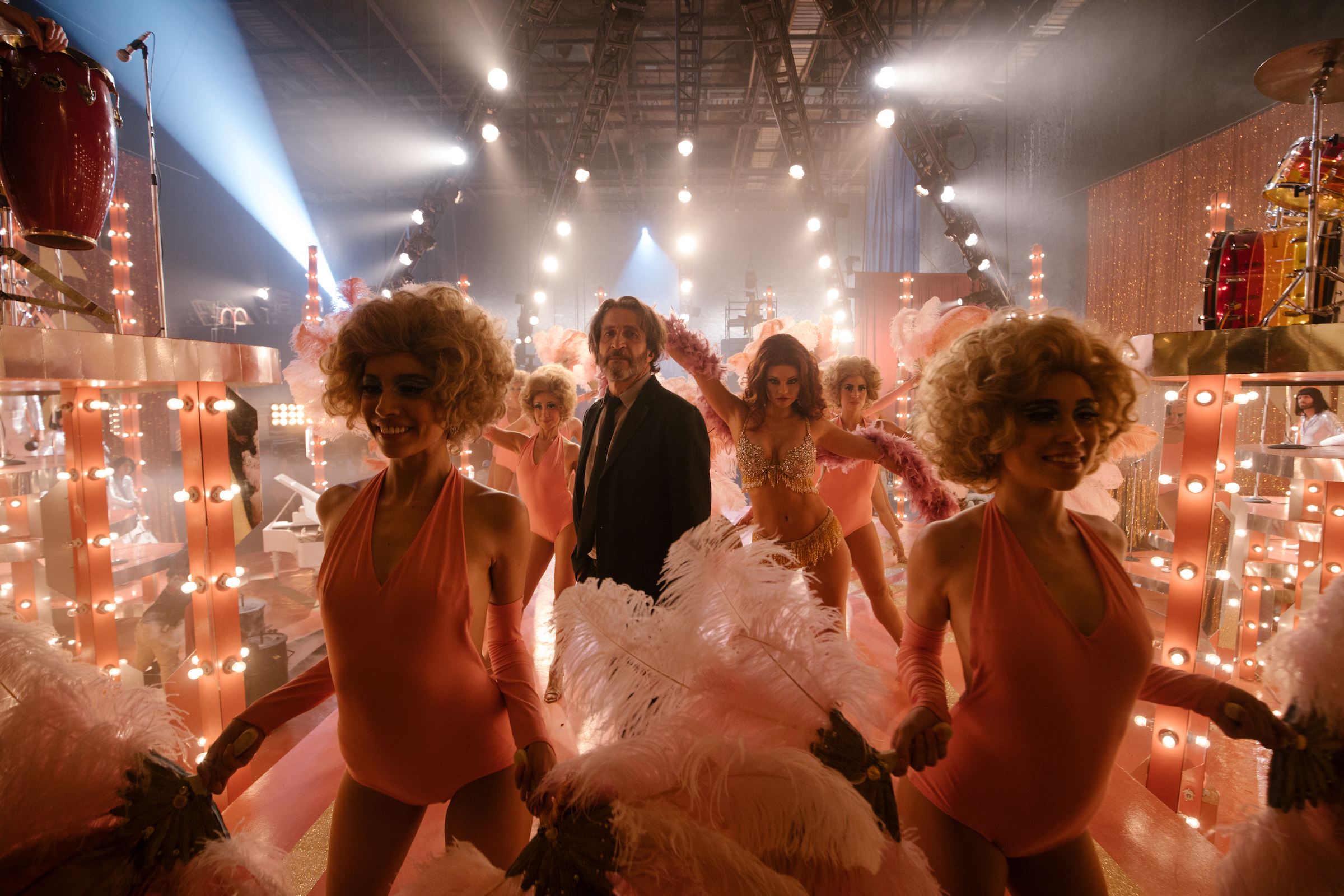
All the world claims to love a grand, ambitious filmmaker—but not really. There’s something in us that makes us more likely to root for the underdog director, the one who makes an intimate film that quietly wows us, than for the one who announces his filmmaking genius with the subtlety of a flare gun.
Enter Alejandro G. Iñárritu’s Bardo: False Chronicle of a Handful of Truths, with a big pop and a lingering, smoky fizzle. In this ambitious semiautobiographical dream riff, Daniel Giménez Cacho plays Silverio, a sometimes arrogant, sometimes bumbling documentary filmmaker who’s about to win a big American prize for his work. Silverio was born in Mexico but has lived mostly in Los Angeles, a place he calls home. But is it really home? This is one of the big questions that swirls through the movie like a bird of prey. Silverio has become successful in a larger pond than the one he left back in Mexico, and his former colleagues there resent him for it. His kids, twentyish Camila (Ximena Lamadrid) and teenage Lorenzo (Íker Sánchez), are extremely Americanized. And there’s some major, haunting heartbreak in his life: he and his wife Lucia (Griselda Siciliani) have lost a child, an absence that has virtually cut a hole in him.
Read more: There’s Lots of Suffering in The Revenant, But Bear With It

That’s the straightforward summary of Bardo. Describing its trippier, existential-spin-art qualities is a bit more complicated. The movie opens with Lucia giving birth to what appears to be a healthy baby boy. But the doctor learns that the infant has other wishes, which he then relays to the mother: The baby doesn’t want to come out; the world is just too messed up. The doctor stuffs the baby back into the birth canal and that, apparently, is that—until, many years later, when the reluctant baby reappears, inopportunely, just as Silverio is about to perform oral sex. Then it’s his job to push the little interloper back in, as if putting a memory into a drawer. As you can imagine, it’s a big-time mood killer.
Nothing is reliable in Silverio’s rubber world, one that keeps stretching and shifting and whirling through space and time. In Mexico, Silverio attends a massive party thrown in his honor; he’s the first Latin American to win that big prestigious American award, and the locals want to fete him. But when he’s called to the stage, he chickens out and dips into the men’s room, where his dead father, big as life and fully alive, greets him warmly. Silverio’s father is a giant to him in all ways, a presence he desperately misses. Iñárritu illustrates that with a straightforward sight gag: Silverio’s body has suddenly shrunk to child-size, while his head—complete with its raggedy beard and persistently forlorn expression—is the normal adult version. What grownup hasn’t felt this at one time another—either the feeling of returning to childhood, or the wish that one could do so?
Read more: How Alejandro Iñárritu Made Oscar History

Bardo isn’t always that straightforward, and often, it’s exhausting. Iñárritu has a lot of thoughts and feelings, and he apparently sought to stuff them all into one movie. (The picture was co-written with Nicolás Giacobone, who also collaborated with Iñárritu on Biutiful and Birdman.) Bardo was three hours long when it premiered at the Venice Film Festival in early September; Iñárritu has since cut 22 minutes from it, though that may not be quite enough. The picture still meanders and drags, and sometimes Iñárritu’s lofty ideas come off like a hot-air balloon that deflates and gets stuck in the trees. You wish he could just move on with things already.
And yet there are some magnificent visions in Bardo. The great cinematographer Darius Khondji helps Iñárritu bring his ideas to life, the grandest of which is a fantasy sequence set in the heart of Mexico City, where Silverio encounters the ruthless Hernán Cortés, standing atop a pile of dead indigenous Mexicans as if it were nothing. Silverio’s feelings about his birthplace may be conflicted, but in the end he knows exactly where his loyalties lie. Those feelings are particularly fierce when it comes to the jagged, exploitive kinship between the United States, his adopted home, and Mexico, the place where part of his heart will always live, whether he likes it or not. (One of the movie’s more bitter and pointed jokes is a revelation that Amazon is making a deal to purchase the state of Baja California.)
Late in the movie, Bardo takes a turn into less fantastical and more personal territory; the movie’s texture becomes warmer and more inviting. And even if you haven’t felt much for Silverio through most of the movie—he’s pretty insufferable—by this point, he becomes touchingly human. Some of the sights along the way have been dazzling, sure, but Iñárritu makes us work to get there. It’s hard to know whether he fully trusts in his audience’s intelligence and powers of perception, or if he knowingly overcomplicates everything just so it will be harder for us to keep up. The truth is probably somewhere in between, an intermediate state that not even Iñárritu can define.
More Must-Reads from TIME
- Cybersecurity Experts Are Sounding the Alarm on DOGE
- Meet the 2025 Women of the Year
- The Harsh Truth About Disability Inclusion
- Why Do More Young Adults Have Cancer?
- Colman Domingo Leads With Radical Love
- How to Get Better at Doing Things Alone
- Michelle Zauner Stares Down the Darkness
Contact us at letters@time.com